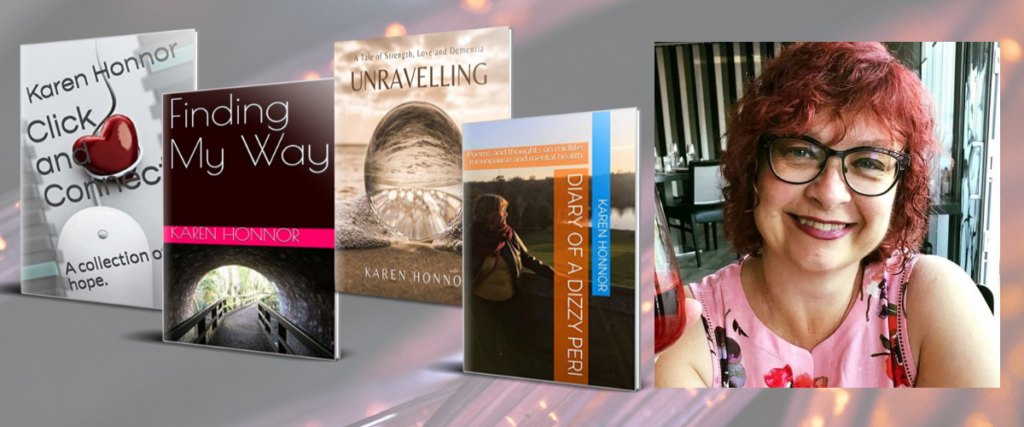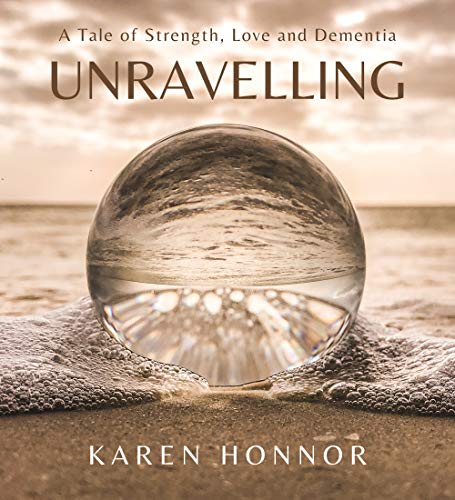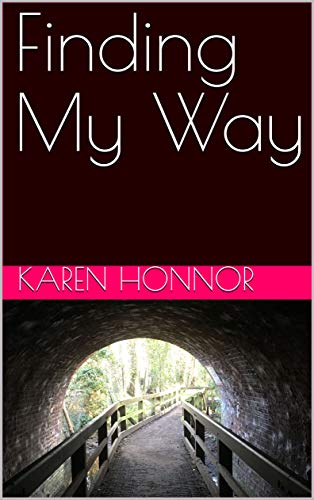Karen Honnor is a poet, a playwright, and an author of short prose and also of a novella, Unravelling. Her work is very personal and she openly deals with the issues facing women as they move through motherhood, midlife and menopause.
Here, Karen talks about her work, and how much of it has connected deeply with her readers and, through them, others in the community.
You can follow Karen’s blog here .
Since completing this interview, Karen has gone on to publish her third poetry collection, Polaroids and Petals – praised for being “touching, nostalgic and tender without being sentimental.’
Find it here.
The past few months, she has been caught up with rehearsals in her local drama group who are bringing her latest script to life, ‘Tales of the Magic Lamp’ ,due to be performed this month. Alongside this, Karen is building up her store of new poems and hoping to create a celebratory collection later this year.
We wish her all the best with these endeavours!

What is your most recent book about?
My most recent book is called Click and Connect – A Collection of Hope and combines pieces of writing that have all emerged as a result of the circumstances we have found ourselves in this past year or so. It is mostly poetry but also some blog pieces and a short story about a community project that I became aware of through connections I have made on Twitter during the last year. The theme running through the book is connection – thinking about how we have supported each other by forging connections in new and different ways.
I have had some emotional responses to it, with one reader in particular contacting me to say how much the poetry has struck a chord with him and wanting me to supply some signed copies for him to donate to the local secondary school. I was honoured and humbled to see video clips of some of the pupils reading the poetry and commenting upon how well the poems summarised the common experiences of lockdown and the hopes for how we move forward.
How did you come to be a writer?
I have always been a writer at some level, I guess. I loved story writing at school, progressed to writing scripts and poetry as I got older. Over the years, I had some of my scripts performed by the children I taught and also by our local drama group and I had a couple of poems published in magazines. Throughout these experiences, I kept telling myself that at some time in the future, if I won the lottery, I would give up the day job, sit by the sea and write stories and poems for a living. Well, I haven’t achieved all of that but circumstances led to me leaving my teaching career in 2018 and since then I have focused on writing. I don’t have the sea view, but I have published four titles so far and that feels like a huge step forward in redefining myself as a writer.
Tell us a little about your non-writing life

I am in my fifties, been married to Stuart for 30 years, am Mum to two grown-up children, Matthew and Zoe, and a furry cockapoo called Gizmo – my daughter named her because she looked like the furry Gremlins character, as a puppy. She keeps us all on our toes with daily dog walks as well as regular snuggles on the sofa.
Before the world got turned upside down last year, I ran a drama group and performed twice a year, choreographed dance routines, wrote much of the script content and enjoyed the camaraderie of being part of a team effort in preparing our shows with a diverse group of people. Most of us have remained in touch this last year and we are waiting for the go ahead to get back on the stage together soon.
I also enjoy baking, anything to do with the 1920s and taking long walks by the sea or in the woods. I think in another life I would like to be a mermaid or a fairy – perhaps that’s another story to write!
Here’s Karen dressed as a flapper girl on a weekend away to celebrate her 50th birthday. Shame we don’t have the dancing on the table pictures!
What do you want your readers to feel when they have closed the last page of your book?
Whichever title it might be that they have read, I would like them to feel connected with the content and that they experience that moment of wishing there was just a little bit more of it to read. I always think that is the sign of a good book – that it has touched me in some way that I feel invested enough to want to know what happened next. I think that can be possible whether it is my poetry, memoir or fiction. Leave them wanting more – I believe that is the phrase but perhaps that is my stage training talking!
Do you hide any secrets in your books that only a few people will find?
I don’t set out to do this but I do think that if people actually know me, then they might read some of my work on a deeper level. Certainly, my real-life experiences weave their way into my writing albeit subconsciously at times.
In my recent novella ‘Unravelling’ there is an untold story of one of the characters that I think some readers will deduce for themselves. I think it is good for readers to have work to do, to join up the dots sometimes.

How much do you base your characters on real people?
My first book was a memoir called ‘Finding My Way,’ so this very much tells my story – in a warts and all fashion. I tell of my experiences through midlife, motherhood and menopause and share insight to the mental health issues I have experienced during this time too.
My poems include personal experiences, characters from real life and ones I have created, depending on when and how the muse takes me.
My fiction is interesting regarding the characters. None of them exist in real life but instead are formed from fragments of people and conversations about people over time. The main character in Unravelling, Doris, suffers from dementia and many of her experiences were drawn from the times I saw my father struggling with his daily life. I also spoke to several people who are about the age of Doris and asked them about their memories growing up. The insight they gave to my research of the East End in the 1950s and 1960s added an authenticity to the scenes I then wrote into the story of Doris and her family.
How much do you draw on real places for your scene-setting?
I think there needs to be enough of a real place in a setting to make it authentic. I researched a lot for my historical fiction, Unravelling, to make the places feel authentic, even though place names and characters were fictional. I write quite visually and I think it is important that the reader can imagine the scene unfolding around them.
What’s the best thing someone has said about your writing?
I was invited to talk at Paramount UK as part of a focus on empowering women in the workplace. The whole day was out of my comfort zone and a lesson in allowing myself to push aside the imposter syndrome and talk about myself as an author. The best part of the experience was having women who had read my memoir, saying how much they had been able to identify with the content, how it had helped them. One said she had taken the book everywhere with her that weekend because she had to finish it. That felt like a real accomplishment and special for me to have made such a connection with a complete stranger, by sharing my story.
Are you friends with other authors, and how do they help you become a better writer?
I love that I have got to know several other authors via the world of social media. The support groups in DM chats etc are really helpful, having somebody to ask who has probably gone through the same issues with their writing, gaining advice about logistics of writing , editing and publishing is great. I particularly like that some of us are planning to meet up in person, when the world starts turning more normally again.
What are your future writing plans?
I have no immediate plans for a new book but my writing takes me by surprise sometimes, with new material starting to take shape seemingly out of nowhere. For now, I plan to keep blogging and to maybe look into creating some sort of YouTube channel or podcast for my poetry – if I am brave enough to do so. I am keeping my options open.
